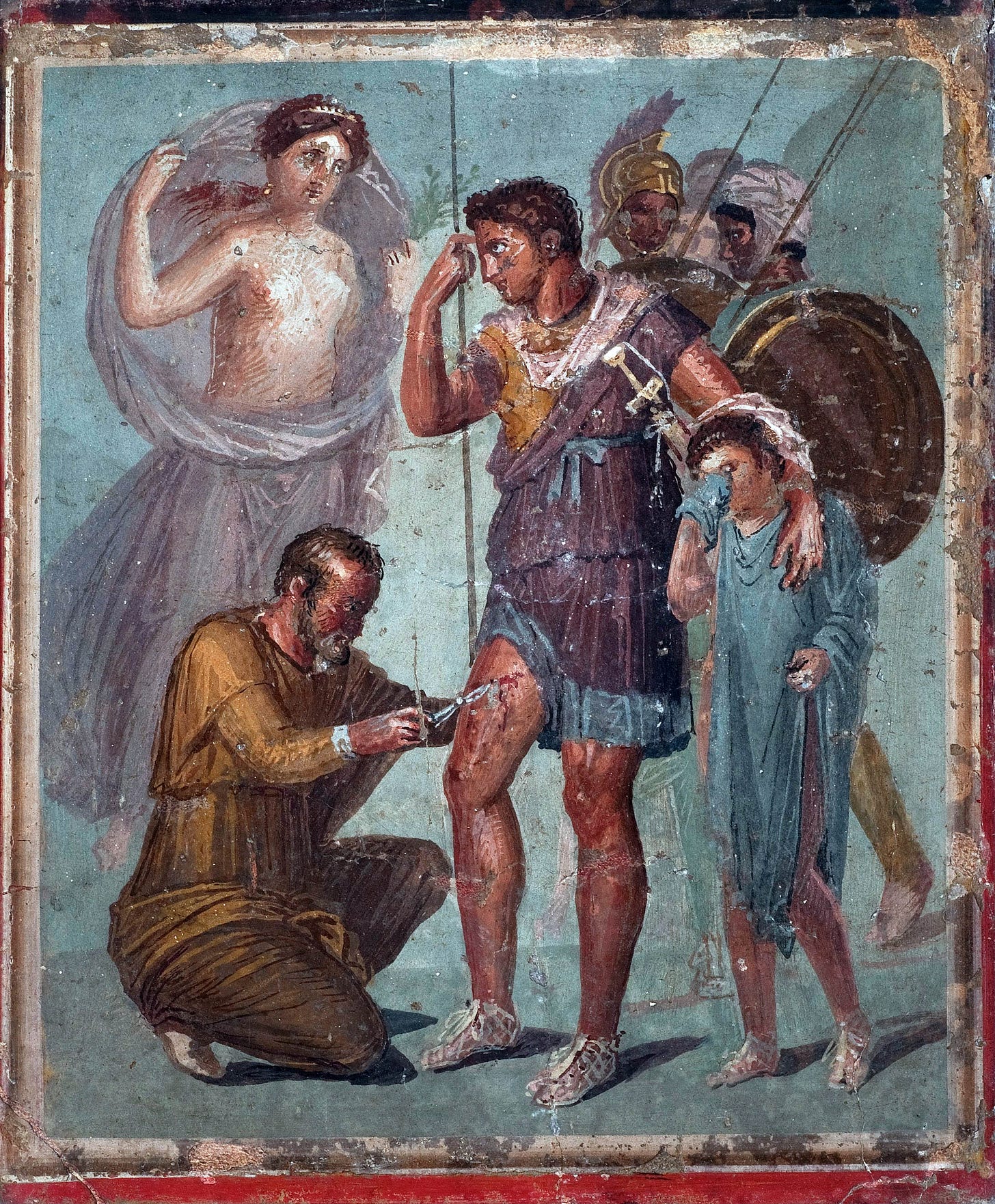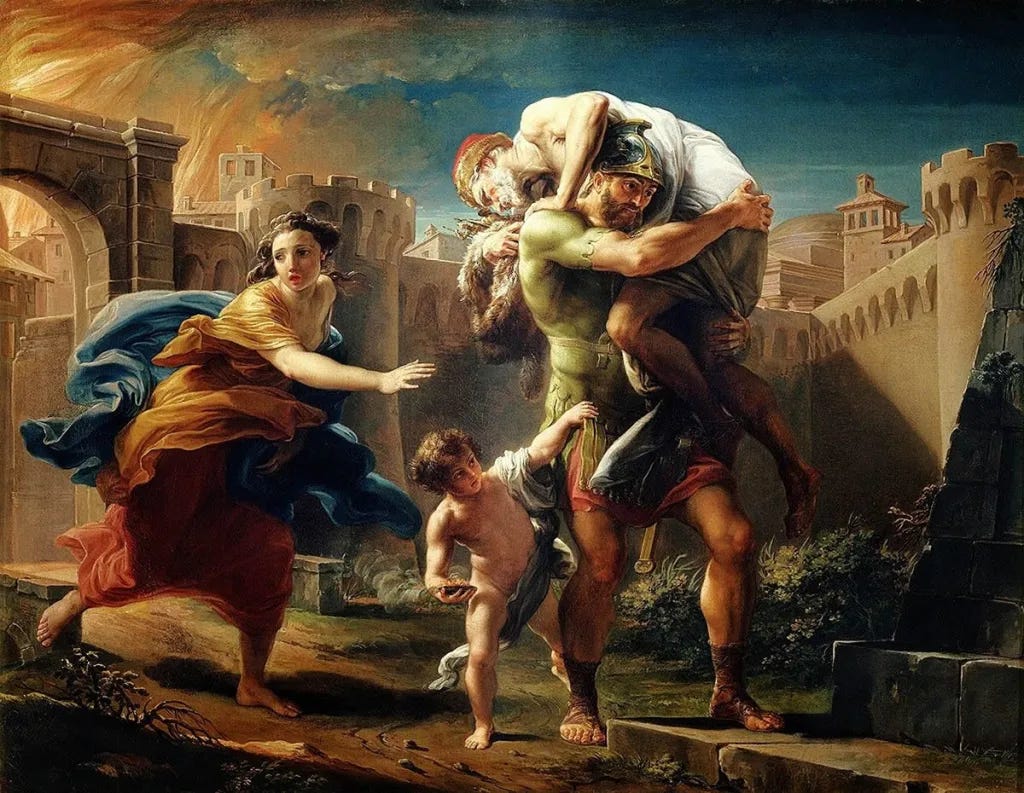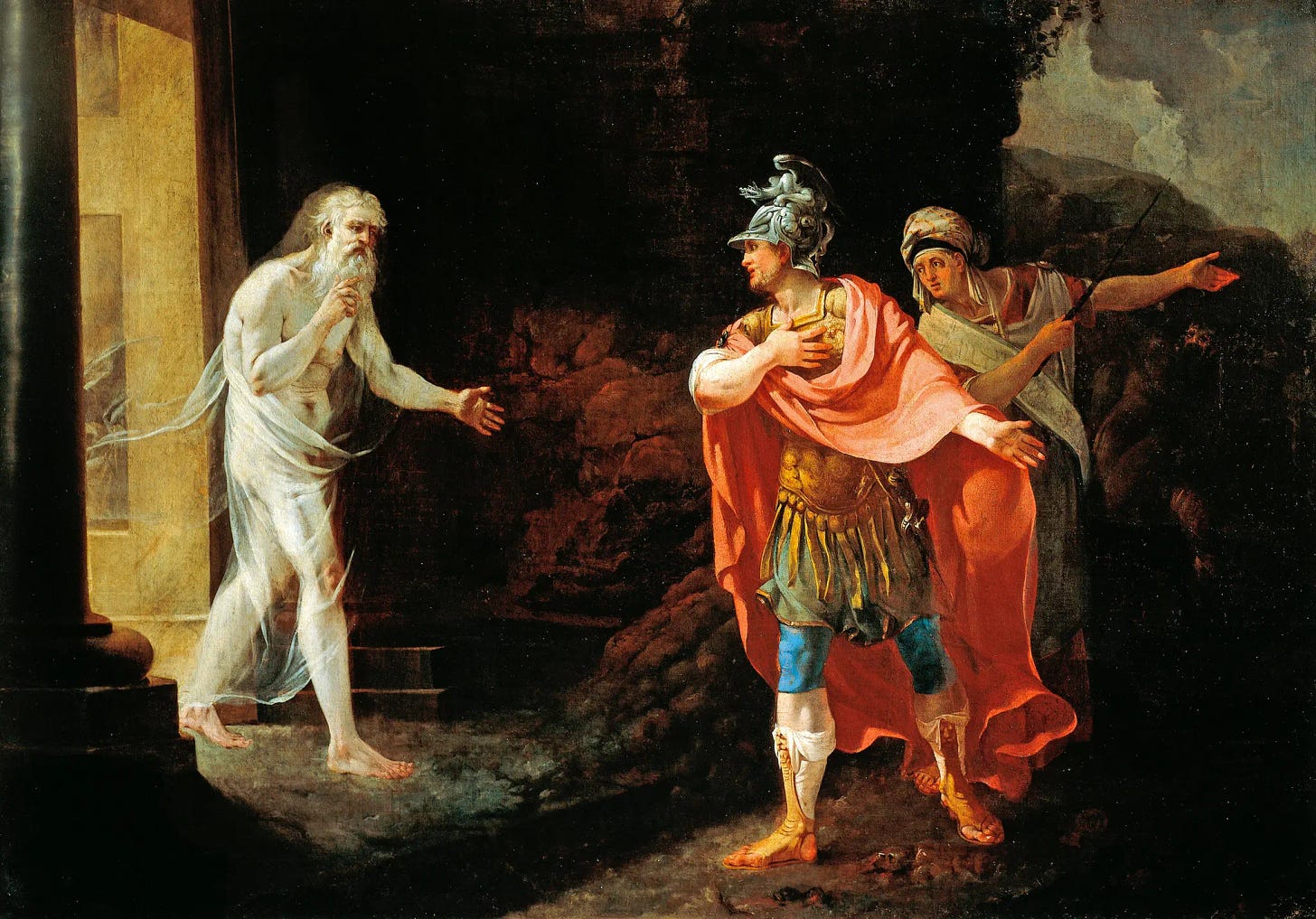Dear Classical Wisdom Reader,
How do things begin?
It’s a big question… but for the Romans, they saw their origins in the city of Troy.
We tend to think of the Greek and Roman worlds as being distinct from one another, but to the Roman mind there was a great link between them.
That link was personified by Aeneas: the Trojan warrior who fled the burning city with his elderly father carried on his back.
He escaped the destruction of Troy and then traversed the ancient seas, much like Odysseus, before founding Rome.
Now, today’s article looks at the life of the famed hero: his semi-divine origins, his time in Troy, and his tragic romance with the Carthaginian Queen Dido.
If you want to know more about Aeneas, be sure to check out our latest episode of Classical Wisdom Speaks, featuring Anya talking to Anthony Adolph about the shadowy line between myth and history…
You can discover just how Aeneas’ story may be the most important myth ever told!
All the best,
Sean Kelly
Managing Editor
Classical Wisdom
P.S. Important Announcement: As of this morning, there are currently only SEVEN cabins left for our 2024 Voyage, leaving September 14th.
So, if you want to follow in the footsteps of those Bronze Age Heroes and explore the very landscape of myth, be sure to take part in our trip of a lifetime: ‘Emperors, Conquerors and Saints’.
Just remember, if you’re interested, act fast!
Aeneas
by Ed Whelan
He is a towering figure of ancient myth.
He fought at Troy and appears in the Iliad. Yet he is remembered for something much greater.
He was seen by the Romans as a paragon of virtue, and one of the founders of their city. One of the world’s most enduring and influential pieces of literature, the Aeneid, was written about him. But who was Aeneas?
The origins of Aeneas
The Greek version of Aeneas is related in two sources: the Homeric Hymn to Aphrodite and the Iliad. According to legends, he was the son of Anchises, a Trojan royal prince. His mother was the Goddess of Love, Aphrodite (Venus in Roman mythology). Aphrodite had made Zeus fall in love with a human woman; in retaliation, he made her fall in love with a human too, namely Anchises. Aeneas was then born on Mount Ida, and was at first raised by nymphs before being taken to his father in Troy.
In ancient Greek, he was known as Αἰνείας (Aineías). Aeneas is a Latin form of the Greek. It has been speculated that the Greek name Αἰνείας meant originally ‘terrible’ or agony. This could refer to his martial prowess, or relate to the fact that his mother predicted his life of struggle when he was born.
In the Iliad, Aeneas is a fairly minor figure, but he is still portrayed as a noble warrior who is notably pious. At first in the Iliad, he holds back from the fighting, because he is angry that he has not received recognition from Priam. Later, he leads a mission to retrieve the body of his brother-in-law Alcathous.
During his time in Troy, Aeneas is rescued twice by the gods because he is destined to have a great future…
Aeneas, the founder of Rome
The legend of Aeneas was later adopted by several Roman writers. The Trojan hero was popular with Romans because he embodied qualities that they valued such as ‘pietas’ or commitment to native land, family and duty. The best-known version of the myth of Aeneas is told in Virgil’s epic poem, the Aeneid, one of the greatest works in all of Classical literature.
In Roman mythology, the focus is on Aeneas and his adventures after the destruction of Troy. During the fall of the city, Aeneas leads his family and a small group to safety. He then leads them on a mission to find a new home for the surviving Trojans. They attempt to found a new city several times, but each time they fail. Eventually, Aeneas’ father Anchises dies in Sicily. Later, Juno sends a storm that drives the Trojans to the shores of Carthage.
There, Aeneas has a six-year affair with the Phoenician Queen Dido. Committed to his duty, he eventually leaves Dido to find a new home for his people. In despair, Dido commits suicide. After arranging funeral games in Sicily, Aeneas lands on the western shores of Italy with his small band. At this time, Aeneas journeys to the Underworld and meets Dido and his father, who predicts that he would establish a great city.
Aeneas and the Foundation of Rome
After returning from the Underworld, Aeneas continued his journeys. The King of the Latins welcomed the Trojans, and allowed them to settle in his territory. Aeneas became engaged to the Latin King’s daughter, Lavinia. This leads to a war with the Rutulian King Turnus, and his allies. In this bloody war, Aeneas emerges victorious.
At this point in the Aeneid, the story of Aeneas ends abruptly, likely because of the death of Virgil. The story of Aeneas was later completed by writers such as Livy and Ovid. After his victory over Turnus, Aeneas founds the city of Lavinium, named after his wife Lavinia. Aeneas has many descendants: one of them became King of Alba Longa, and was the progenitor of Romulus and Remus, the founders of Rome. Upon his death, Venus had Jupiter make him immortal, and he ascended into the heavens to live like a god.
Aeneas and Roman Culture
The story of Aeneas and his adventures was used to explain the foundation of Rome and justify its imperialism. Similarly, the tragic love affair between Dido and Aeneas was used to explain the enmity between Carthage and Rome.
Aeneas was seen as the embodiment of Roman virtues, especially his pietas. The story of Aeneas was used to promote social and cultural ideas that had come to be considered essential for Roman greatness. They were instrumental in teaching and reinforcing Roman ideas on morality, and in justifying its empire as something moral and noble.
The stories of Aeneas also demonstrate the power of myths, and how they can be adapted. Aeneas was a minor figure in the Trojan War. Yet when the Romans adopted him, he became something of a ‘national hero.’








This story is so similar to the Iliad/Odyssey it holds no interest for me.